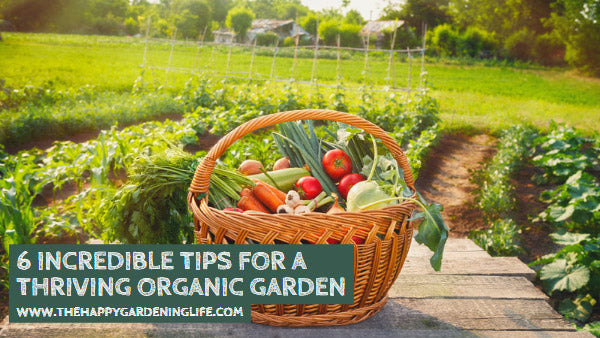
6 Incredible Tips for a Thriving Organic Garden
Share
 Growing an organic garden is not only good for inviting a brighter atmosphere at home but also for securing a continuous food supply. But while it’s a very advantageous hobby, it can sometimes be challenging to succeed in it. Don’t worry, though! Plenty of tips are available to help you achieve an organic garden that thrives.
Growing an organic garden is not only good for inviting a brighter atmosphere at home but also for securing a continuous food supply. But while it’s a very advantageous hobby, it can sometimes be challenging to succeed in it. Don’t worry, though! Plenty of tips are available to help you achieve an organic garden that thrives.
Applying some simple techniques such as creating a practical plan, enhancing soil quality, adding some good mulch, planting properly, and watering the plants wisely are all important in your quest for a successful garden.
Anyone can master these six gardening techniques as long as you have the patience and determination to do so. With the right application, you should soon grow a thriving garden that you can truly be proud of!
For more details, just read on below and don’t forget to share this article with your friends on Facebook, Twitter and Pinterest today!
6 Tips for a Thriving Garden
1. Plan Your Garden
A complete plan should be made to plant a healthy garden, which may save you a lot of time and energy later. Everything is important, from selecting the right place for a garden to choosing what you can grow according to the season. Keep in mind what kind of garden you want to grow: a fruit garden, a vegetable garden or a flower garden. Know when to sow and when to reap. And the area should also be selected according to your plants’ need of sunshine.
2. Your Soil Matters a Lot
Soil needs a boost as well, which can be done by adding some simple organic matter to it. Such organic material includes the addition of a 2- to 3-inch wide layer of compost, decayed leaves, dry grass clippings, or old manure. It enhances the nutrient level and encourage life-giving soil microbes and worms.
3. Mulch, The Best Friend of Your Garden
Sun, rain and mulch are known as the best friends of a garden. A couple of inches of mulch will help in keeping weeds out and water in. The different sorts of mulch which are available are pine needles to cocoa hulls to bark chips. As for a vegetable garden or bed of annuals, you may choose a mulch that decomposes in a few months. Longer-lasting mulch is used for perennials, such as bark chips.
4. When to Plant
The ideal time to plant is when there is rain in the forecast and no frosts or heat waves expected. In case forecasts are not that helpful, then try to plant in the late afternoon or early evening to minimize the time the seedlings bake in the sun. And before planting anything, water the soil a day before to keep it moist.
5. Planting
You should know which species to plant together depending on their similar requirements of soil, light and nutrients. You can either plant a single type or multiple types. Planting different species together may eliminate the risk of facing attacks from plant-specific pests. Keep some space between your plants. Spacing is good for their growth and the bare patches can be filled with flowering plants.
6. Water Wise
The most important element in a plant’s life is water. Seedlings should never dry out; they should be watered daily while they are small. New transplants also need frequent watering, every other day or so, until their roots become firm. The rest of the water requirements depend on your soil and climate. Watering should be done slowly and deeply. The way you water a plant determines its health.
Article Source: cheapvegetablegardener.com
